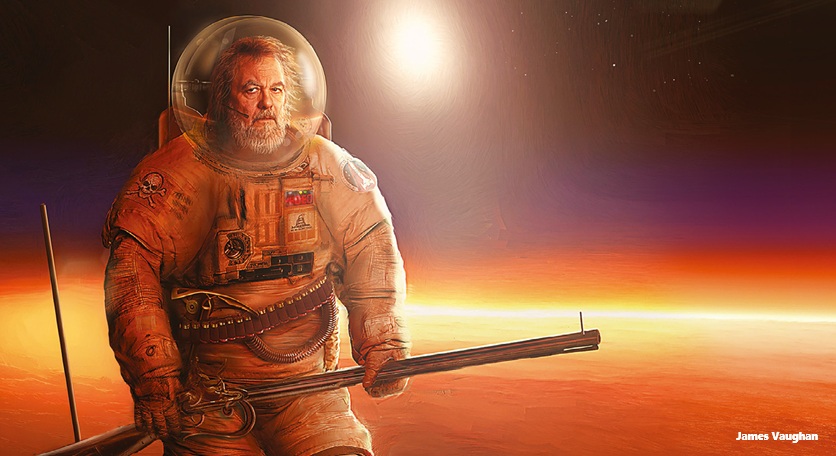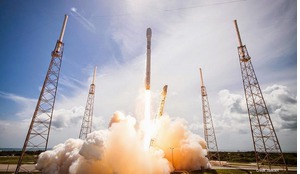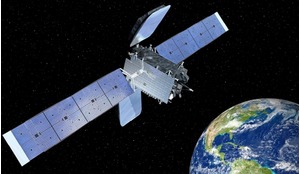As global commercial space activity continues to surge, the pace of innovation is challenging the ability of governments and regulators to keep up. In this thought-provoking opinion piece for ROOM Space Journal, former UK Science Minister and Member of the British Parliament George Freeman argues for a bold, proactive approach to agile industry-led regulation shaping a globally coordinated, ethically grounded framework for space governance. Drawing from the country’s tradition of regulatory leadership and its emerging role in space, Freeman makes the case for convening the world’s spacefaring nations and companies to ensure the next great Space Age benefits all humankind.
We are on the cusp of the second great Space Age - a space race led this time not by a Cold War military arms race but by a rapidly emerging global commercial space sector. This private sector space race is creating a new ‘Wild West’ in space, the ultimate ‘New Frontier’ of human innovation. The speed of the race is rapidly outpacing minimal existing regulatory frameworks, presenting one of the most profound challenges to international governance in the 21st century. From space debris to space traffic control, lunar mineral rights to astronaut health, the space sector is rapidly creating new opportunities - and threats - which will require a basic regulatory framework to be commercially sustainable.
The commercial space race is rapidly becoming no longer a matter for science fiction. It is unfolding at speed right now. With the pace of satellite launch doubling every year, private companies building Moon landers and planning Mars missions, and governments forming partnerships with space startups to fuel their ambitions, this new era is marked by a new public-private partnership. The extraordinary symbiotic relationship between NASA and SpaceX highlights the opportunities and risks. In this new era, space is no longer the exclusive domain of sovereign governments but the new frontier of global commerce, research, defence, sustainability - and humanity’s collective future.
This private sector space race is creating a new ‘Wild West’ in space, the ultimate ‘New Frontier’ of human innovation
The key question now is not whether this expansion will continue but whether our global institutions and regulatory bodies can move fast enough to shape a framework that is safe, sustainable, open and competitive enough to be financially sustainable. For this commercial space sector to flourish it will need a framework for insuring risk, limiting liabilities and developing common standards and protocols in just the same way as the internet, telecoms, automotive and shipping industries have required in their time.
 In June 2023, King Charles III unveiled the Astra Carta seal to astronauts, business leaders, environmentalists and scientists at a Space Sustainability event in Buckingham Palace, London. The Astra Carta initiative aims to convene the private sector in creating and accelerating sustainable practices across the global space industry. It also recognises the unique role that space can play in creating a more sustainable future on Earth and the need for the space industry to consider environmental and sustainability impacts beyond our planet.
In June 2023, King Charles III unveiled the Astra Carta seal to astronauts, business leaders, environmentalists and scientists at a Space Sustainability event in Buckingham Palace, London. The Astra Carta initiative aims to convene the private sector in creating and accelerating sustainable practices across the global space industry. It also recognises the unique role that space can play in creating a more sustainable future on Earth and the need for the space industry to consider environmental and sustainability impacts beyond our planet.
The history of human innovation is also a history of regulation. Just as the 20th century required governance systems for the seas, air travel, nuclear energy and finance, the 21st century demands an equivalent framework for space. The risks of inaction are clear: congestion in low Earth orbit, satellite collisions, the proliferation of space debris and the militarisation or monopolisation of space by a few dominant actors shutting out competition. Establishing a global, commercial, agile framework for effective regulation of space threats is in everyone’s interests. The time for conversations has passed. We must now move to implementation.
As the UK’s Minister for Science, Research and Innovation (2021 to 2023), with responsibility for space, I was proud to lead the UK Government’s first space strategy, building on the Space Industry Act, Civil Aviation Authority (CAA) licensing, and the UK Space Agency’s expanding remit. As Science Minister I was a member of the newly created Cabinet Committee for Science and Technology, and the National Science and Technology Council (NSCT) and Space Council, both chaired by the Prime Minister.
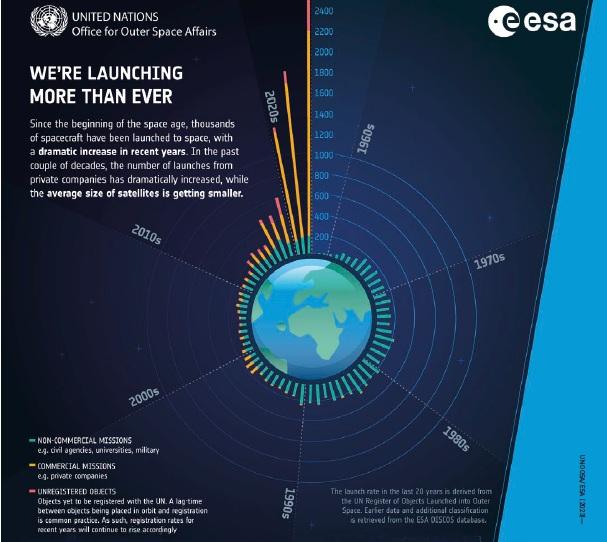 Infographic showing the increase in space launches from the launch of Sputnik in 1957 to June 2023, derived from data from the UN Register of Objects Launched into Outer Space. The graph, also shows the number of unregistered objects (red) has increased in recent years. It should be noted that these objects are not registered with the UN and will rise.
Infographic showing the increase in space launches from the launch of Sputnik in 1957 to June 2023, derived from data from the UN Register of Objects Launched into Outer Space. The graph, also shows the number of unregistered objects (red) has increased in recent years. It should be noted that these objects are not registered with the UN and will rise.
Highlighting the vital role of innovative regulatory leadership I launched the Space Regulatory Review and chaired the UK government’s taskforce to secure regulatory clearance for the first commercial space launch from the UK at Spaceport Cornwall, the first regulated spaceport in Europe.
During this time what became increasingly clear was the urgent need for coordinated, international regulation capable of evolving alongside and at the pace of innovation. In 2022, I convened the first global Space Debris Summit in London with The Royal Society and His Majesty King Charles’ Astra Carta space sustainability initiative and convened with Lloyd’s of London the Earth Space Sustainability Initiative (ESSI) which is now setting global standards and protocols being adopted internationally.
Global regulator
Good regulation empowers innovation. Clear rules give investors and entrepreneurs confidence
After a 15-year career in entrepreneurship and technology venture capital and then 15 years in Parliament as a Conservative MP and Minister championing the enterprise economy, you might expect me to be a champion of ‘deregulation’, right? Wrong!
Over the last nine years since the UK left the European Union (EU) there has been a lot of talk about our securing ‘regulatory freedom’ from the EU’s slow, cautious and bureaucratic regulatory framework based on the ‘precautionary principle’. Many Brexiteers (who voted for the UK to leave the EU) have tried to make the case that we should be using those freedoms to ‘slash red tape’ in a deregulatory bonfire of regulations.
 Comparing space to a highway network. Who would want to drive on a highway scattered with broken down vehicles and debris, on which 90 percent of vehicles are unmanned and uninsured, with no police, vehicle licensing or manufacturing standards?
Comparing space to a highway network. Who would want to drive on a highway scattered with broken down vehicles and debris, on which 90 percent of vehicles are unmanned and uninsured, with no police, vehicle licensing or manufacturing standards?
I disagree. Whilst of course we need a more agile and less bureaucratic model of regulation and there are always some daft regulations that should be scrapped, the big opportunity for the UK as a trusted global regulator and innovation hub is not a race to the bottom to scrap health and safety and environmental regulations. It is the opposite. A race to the top – making the UK a leader in the modern, agile (digital), evidence-based regulation of new technologies and innovation sectors. Setting the standards for the global industries of tomorrow from artificial intelligence (AI), agritech and autonomous vehicles to bioengineering, cleantech, fusion, quantum and space.
This is why I was delighted to be asked by the Prime Minister in 2021 to co-chair the Taskforce on Innovation Growth and Regulatory Reform (TIGGR) independent report [https://www.gov.uk/government/publications/taskforce-on-innovation-growth-and-regulatory-reform-independent-report] making the case for the UK to use its post-Brexit regulatory freedoms to lead a race to the top by embracing a role as the global regulatory leader in emerging technology sectors and markets.
Setting clear standards, protocols and industry ‘Kitemarks’ is a win-win for all, providing a clear global framework that all innovators, investors and customers in new markets can have confidence in.
In the same way that Britain helped shape the early frameworks of maritime law, international insurance through Lloyd’s, and pioneering ethical governance in life sciences with the Human Fertilisation and Embryology Authority, we now have the opportunity – and the responsibility – to lead on global space regulation.
Our universities, law firms, insurers and space scientists are among the best in the world. The UK is home to global leaders in Earth observation, satellite communications and climate modelling. But our unique value is not only technical. It lies in our reputation for trusted, ethical, liberal-democratic leadership in shaping the rules of open markets.
Space debris risk
The growing risk of space debris is the most obvious immediate threat to the sector arising from lack of regulation and that’s why I decided to do something unusual: convene, invite and empower the space industry and insurance provider Lloyds of London to come together with the Government to create a framework of debris mitigation protocols and standards which could be the basis of providing those who comply with easier and more competitive insurance; quicker and easier licensing; and preferential access to space finance.
Led by Joanne Wheeler MBE, partner in space law at Alden Legal, the project – the Earth Space Sustainability Initiative (ESSI) is now up and running and creating standards being adopted by the space sector, in the UK and globally.
The time for conversations has passed. We must now move to implementation
As UK Minister for Space, I often compared space to a highway network. Who would want to drive on a highway scattered with broken down vehicles and debris, on which 90 percent of vehicles are unmanned and uninsured, drifting around crossing lanes unpredictably, with no police, vehicle licensing or manufacturing standards? Not me. And not many people or companies. Especially companies who have invested vast amounts of time and money in getting their precious cargo into space.
The race to avoid ringing our planet with a ‘wall of metal’ is urgent. We need to move on quickly from an unregulated ‘Wild West’ of space in which the carrying capacity of the satcom sector is a function of who can get the most metal launched most cheaply, to a model in which we can carry much more data on much higher volume spectrum bandwidths with much higher shared spectrum capacity. If the future of satcoms is not in volume of ‘metal’ it must be in increasing the carrying capacity of a smaller number of constellations useable by all.
The regulatory gap in space is real. With over 8000 Starlink satellites in orbit (as of July 2025) and thousands more planned, we risk turning low Earth orbit into a traffic jam of satellites and debris, with knock-on effects for telecommunications, climate monitoring and human spaceflight. Current United Nations mechanisms like the Committee on the Peaceful Uses of Outer Space (COPUOS) and the Outer Space Treaty are vital but slow moving, often hampered by geopolitical gridlock.
Space health
Just as the race for space is opening up an urgent debris problem that needs solving, so the race for manned space travel with manned flights to the Moon and Mars and space tourism is creating a demand for much better understanding of the health impacts of space travel on human physiology and health.
This is an area of growing interest because the renewed focus on human space travel; in the global space race between the US and China geopolitically, and the commercial race for space between companies like SpaceX and Blue Origin is driving increased interest in - and understanding of - the human health impacts of space travel.
We have long known that human space travel has major impacts on human health. My first serious interest in this field started as first UK Minister for Life Science when I bumped into ESA astronaut Tim Peake at Culham science and innovation campus in 2014 as we left separate speaking events. Tim explained that he was the ‘lab rat’ in some 20 experiments on how and why human health (from retinal function to bone density) deteriorates in space and then repairs back on Earth, with potentially very exciting implications for our ability to understand the mechanisms of disease progression, and ways to reverse it.
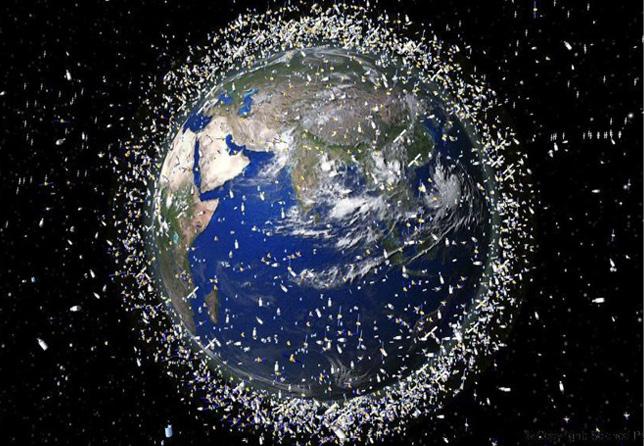 Impressionist interpretation of space debris in Earth orbit.
Impressionist interpretation of space debris in Earth orbit.
But I was intrigued by what the mechanism of action could be. How could gravity alone explain this effect? It can’t. In life science it is increasingly clear that mitochondrial health and cellular biokinetics are key to many disease statistics, as our understanding of the causal mechanics of the mechanisms of disease deepens from early 20th-century observations of surface level manifestations of disease, through the biochemical pathways of disease to genomics and proteomics, to a much deeper understanding of the underlying core cellular ‘programming’ of cell health and function.
To protect astronauts and space tourists, allow human space travel to be physiologically and financially sustainable and harness space as the ultimate laboratory for better understanding the mechanisms of action of human disease and ageing, we need a framework for sharing data, deepening our understanding of the impact of space travel on human physiology and defining the parameters for safe and healthy human space travel.
Regulatory summit
Space is no longer the preserve of science fiction or government astronauts but the new commun-ications superhighway of the new global economy
That’s why I’m proposing that the UK leads the creation of an international Space Regulatory Summit – bringing together spacefaring nations, industry leaders, insurers, scientists and civil society to agree principles and protocols for responsible space activity. This could include guidance on satellite disposal, collision avoidance, orbital lane assignment, in-space servicing, crew safety and planetary protection. It could also tackle frontier issues such as AI in space operations, lunar resource governance and dual-use technologies.
Just as the Montreux Convention governs straits, or the Chicago Convention aviation, and the International Maritime Agency in London shipping, we now need a ‘Geneva Convention’ for space: a living, adaptive regulatory framework that can evolve with the pace of innovation.
This is not a call for heavy-handed bureaucracy. Quite the opposite. Good regulation empowers innovation. Clear rules give investors and entrepreneurs confidence. The UK Space Agency’s regulatory ‘sandbox’ approach is a model – allowing innovation within controlled conditions while managing public safety.
We must also ensure regulation reflects international cooperation, not competition. While space is an arena of strategic rivalry, it must also remain a domain for peaceful and shared progress. That means engaging with allies and rivals alike, aligning standards where possible, and ensuring inclusivity so that developing countries can also benefit from space science and infrastructure.
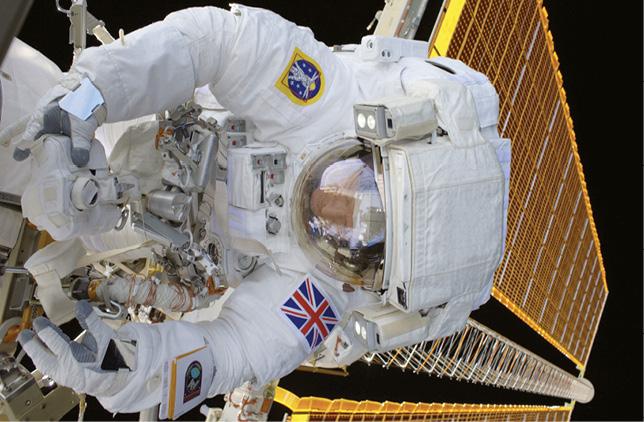 Astronaut Tim Peake during his four hour and 43-minute spacewalk to replace a failed power regulator and install cabling on the International Space Station. Back on Earth, Tim was the subject of some 20 experiments on how and why human health deteriorates in space and then repairs back on Earth.
Astronaut Tim Peake during his four hour and 43-minute spacewalk to replace a failed power regulator and install cabling on the International Space Station. Back on Earth, Tim was the subject of some 20 experiments on how and why human health deteriorates in space and then repairs back on Earth.
This includes climate data. Satellites already help us monitor global emissions, deforestation and extreme weather. The more widely available this data is, the more we can empower local decision-makers and global climate action. Commercial operators must be encouraged to share such public-benefit data in ways that support transparency and resilience.
In the UK, we’ve made promising steps – updating licensing processes, launching the Regulatory Review and hosting global events. But more can be done and I believe we should:
- Convene a London Space Risk, Regulation and Innovation Summit
- Take ESSI as a model for a similar collaboration in space health
- Use a common regulatory framework to forge new partnerships between regulators, insurers and innovators
- Establish a permanent Centre for Space Ethics and Governance
- Embed regulatory science into space research and education
- Launch a global ‘Space Commons’ initiative to preserve open access for scientific collaboration.
The UK’s G7 presidency in 2021 highlighted the country’s ability to lead multilateral initiatives. As Chair of the G7 Future of Regulation conference and the G7 Genome Summit, I saw firsthand how Britain can bring partners to the table. We must now apply that convening power to space.
This is a global moment. The US, EU, Japan, India, the Gulf States, Australia, Brazil and Africa are all developing or revising their space strategies. The window is open for - and the sector urgently needs - international cooperation. If we do not act to frame a space sector underpinned by the shared values of responsibility, sustainability, transparency and accountability, which are the key to free enterprise for the benefit of all, others – perhaps with very different values – will write the rules.
Space is no longer the preserve of science fiction or government astronauts. It is becoming integral to our economic infrastructure, environmental monitoring, defence capability and human imagination. If we are to preserve it as a shared domain, we must act with vision and responsibility.
The second Space Race is not simply about who gets to the Moon first – but about who helps set the rules that govern our shared future among the stars.
About the author
George Freeman MP was Elected to Parliament in 2010 after a 15-year career in technology venture capital. George has held a number of key science and technology Ministerial roles over the last 14 years. In 2024, he was elected Deputy Chair of the Science and Technology Select Committee and, in January 2025, appointed as UK Trade and Investment Envoy to Singapore, Malaysia, the Philippines and Brunei. He is the author of over 50 published articles and OpEds and has been an outspoken advocate of more proactive and agile UK regulation and procurement for innovation and active industrial sovereignty.





